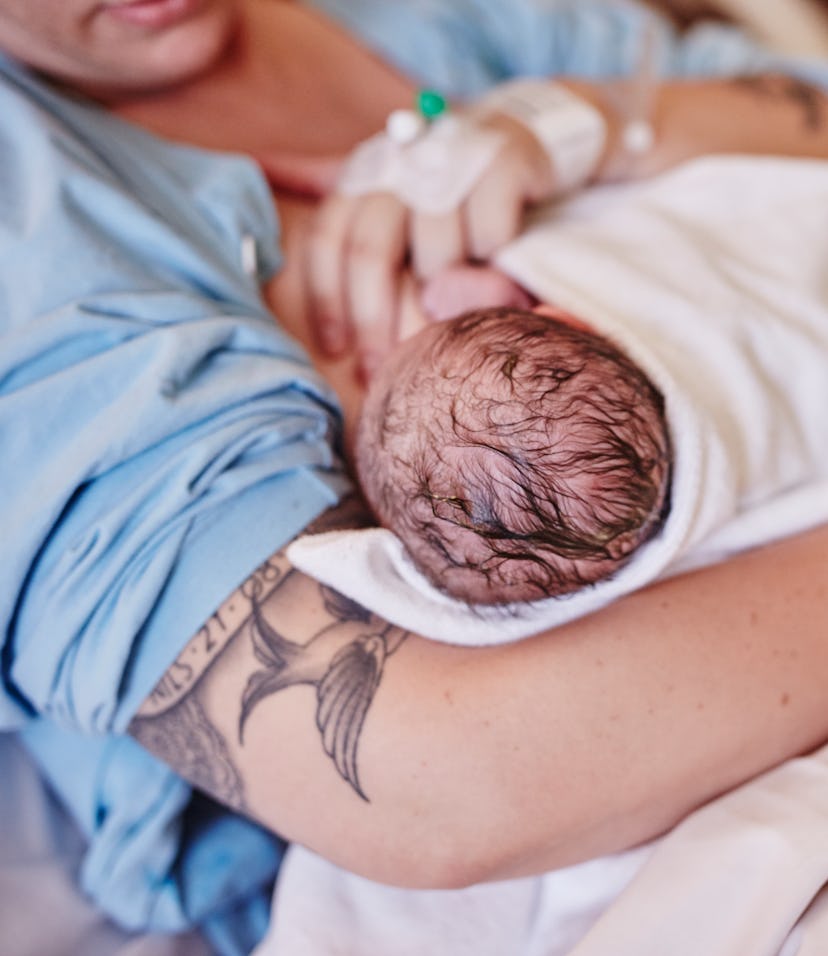Politics

Had A Baby In 2020? You May Qualify For An Extra $1,100 In Stimulus Money
Here's exactly what tax experts say you need to know to claim it.
When direct stimulus payments were distributed by the Internal Revenue Service (IRS) in 2020, there was one group completely overlooked: children born, adopted, or fostered in 2020. But parents can still collect stimulus money for children they welcomed in 2020, if eligible, by claiming the Recovery Rebate Credit (RRC) when filing their 2020 taxes. Here's what tax experts tell Romper parents will need to know about securing the credit.
"Adults who were eligible for stimulus and became parents of children born, adopted, or fostered in 2020 may be eligible for $1,100 in extra stimulus," Mark Steber, Chief Tax Information Officer at Jackson Hewitt, the nation's second-largest tax preparation service, tells Romper.
That's good news for parents who may have struggled during the ongoing pandemic to cover the added expenses that come with welcoming and caring for a new child. Whether it's a newborn who goes through a dozen diapers and wipes a day or a newly adopted 6-year-old who needs new clothes and homeschool supplies, raising kids is expensive. In fact, the U.S. Department of Agriculture has previously estimated that it costs roughly $233,610 to raise a child from birth to age 17. And while the stimulus payment received through the Recovery Rebate Credit certainly won't stretch far enough to cover that total cost, every little bit helps.
Why Were Babies Born In 2020 Left Out Of Initial Stimulus Payments?
"Since the stimulus payment or recovery rebate credit was based on either 2019 or 2018 taxes, a tax family may have missed out on the extra amount because the family added a qualifying child since they filed a return," Alison Flores, a principal tax research analyst at the Tax Institute at H&R Block, tells Romper. "When the 2020 tax return is filed, the tax family should be able to claim the additional $500 and $600 of recovery rebate credit per child and any other stimulus credit reconciliation as a refundable credit."
In short, children who were welcomed into families in 2020 were unaccounted for when stimulus payments were distributed simply because the IRS didn't know they existed. After all, who sends a birth announcement to the IRS?
Which Children Qualify For The Credit?
According to Steber, babies who were born in 2020 aren't the only children who would qualify for the Recovery Rebate Credit should their parents meet the income eligibility requirements. If the filer(s) meet the income requirements, any new child reported on a 2020 tax return would make them eligible for a $1,100 Recovery Rebate Credit. (That's $500 from the first stimulus and $600 from the second.)
This includes a child born between Jan. 1, 2020, and Dec. 31, 2020, and a child under the age of 17 who was adopted or fostered during that same period. It also includes children who a parent trades off in claiming as a dependent with another adult parent. "For example, the ex claimed the child on the 2019 return and got $1,100 in combined payments for the child," Steber elaborates in comments to Romper. "Spouse is claiming the same child on the 2020 return and will get an RRC of $1,100 for the same child."
What Are The Income Limits?
Child credits claimed through the Recovery Rebate Credit are subject to the same income phaseouts and limits that direct stimulus payments were subject to. That means single filers with an income of $99,000 or above and married couples who file a joint return with an income of $198,000 or above won't qualify for the credit.
Additionally, single filers with an income between $75,000 and $99,000 will have their child credit payment reduced by $5 for every $100 their income comes in above the phaseout threshold. For individuals who file as a head of household, the phaseout limit begins at $112,500. For married couples who file jointly, the phaseout limit begins at $150,000.
But Steber warns there is no repayment required for taxpayers who may have been paid too much stimulus based on their 2019 return.